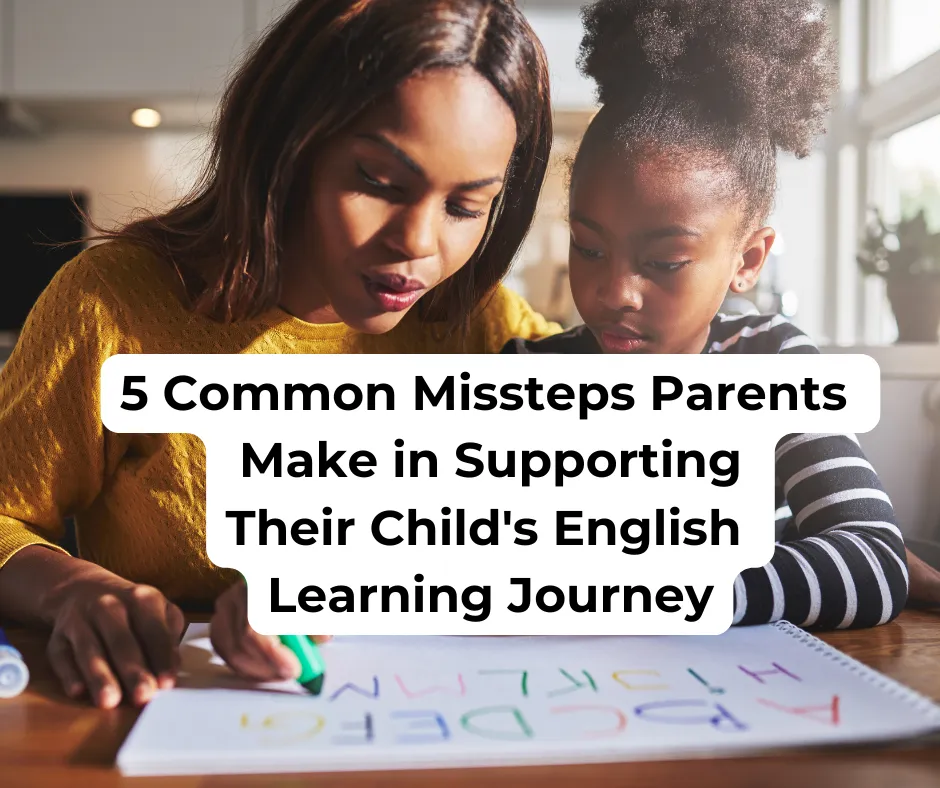5 Common Missteps Parents Make in Supporting
Their Child's English Learning Journey
Written by Miss Sealey March 2024

5 Common Missteps Parents Make in Supporting Their Child's English Learning Journey
As parents, we all want the best for our children, especially when it comes to their education. English, being a core subject, plays a crucial role in a child's academic and personal development. However, in our well-meaning efforts to support our children, we can sometimes unknowingly make mistakes that hinder rather than help their progress. Here are five common missteps parents make in supporting their child’s English learning journey and how to avoid them.
1. Focusing Solely on Grades
It's natural to want your child to excel academically, but an overemphasis on grades can create unnecessary pressure. When a child feels that their worth is tied to their report card, it can lead to anxiety and a fear of failure. Instead of focusing solely on grades, celebrate the effort your child puts into their work. Encourage a love of learning for its own sake, and the grades will often follow. Remember, progress in English is not just about achieving top marks but also about developing skills that will serve them throughout their lives.
2. Overloading with Extra Work
When parents see their child struggling with English, their first instinct is often to provide more work—extra worksheets, additional reading assignments, and so on. While practice is important, overloading your child can lead to burnout and resentment towards the subject. Instead, focus on quality over quantity. Engage your child with creative and interactive activities that make learning fun. Incorporate games, storytelling, and discussions to help them connect with the material in a meaningful way.
3. Neglecting the Power of Reading for Pleasure
Many parents push their children to read academic texts or classics that may not interest them, thinking it will boost their English skills. However, forcing a child to read material they find dull can kill their interest in reading altogether. Encourage your child to read for pleasure, whether it's comic books, fantasy novels, or magazines. The key is to develop a habit of reading, which naturally enhances vocabulary, comprehension, and critical thinking skills.
4. Ignoring the Importance of Writing Practice
While reading is essential, writing is equally important in mastering English. Some parents may focus heavily on reading without encouraging their child to write regularly. Writing helps children organise their thoughts, express their ideas, and develop their voice. Encourage your child to keep a journal, write stories, or even pen letters to friends and family. Provide positive feedback and celebrate their creativity, which will help build their confidence in writing.
5. Not Tailoring Learning to Your Child’s Style
Every child learns differently, yet many parents use a one-size-fits-all approach to education. Some children thrive on visual aids, while others may prefer auditory learning or hands-on activities. Take the time to understand your child’s learning style and adapt your support accordingly. If your child is a visual learner, use mind maps, videos, and illustrations to explain concepts. If they are auditory, engage in discussions or use educational podcasts. Tailoring the learning experience to their needs can make a significant difference in their engagement and success.
Supporting your child's English learning journey is a delicate balance. By avoiding these common missteps, you can create a positive and nurturing environment that fosters a genuine love for the subject. Remember, the goal is not just academic success but also helping your child become a confident, articulate, and lifelong learner.

Miss Sealey
Miss Sealey supports KS2 students who are good at Math but struggle with English writing to significantly improve their skills, have fun while learning, build confidence and be exam ready. She lays a strong foundations for future academic success for your child by helping to overcome academic anxieties

